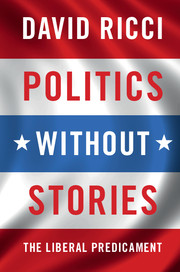2 - Liberal Books
Published online by Cambridge University Press: 05 August 2016
Summary
Democrats never agree on anything. That's why they are Democrats. If they agreed with each other, they would be Republicans.
American humorist Will Rogers (c.1920s)The shortfall on alpha stories appears in typical liberal books, some of which I will now describe. So many of those are available that there is no way of drawing from them a “scientific” sample which can represent the entire class of such items. Still, to consider even a few books written by liberal scholars, publicists, and politicians, is to get a sense of their main characteristics, among which there is a certain disjuncture between the tales told by one book and another. Later, we will consider a fourth group of liberal books, suffering from their own narrative shortcomings but written by philosophers.
In all of this, some of the writings that I am about to describe, having been written years ago, may not seem much relevant to leading public issues today. However, my point is that we should highlight the coming authors not because they have made memorable contributions to modern knowledge but because, in an important way, they are not all on the same page.
Scholars
John Kenneth Galbraith
Economics professor John Kenneth Galbraith's The Affluent Society (1958) highlights America's passion for economic growth as defined by Gross National Product. Galbraith argues that most people admire this growth not only because they hope to acquire more of an ever-expanding economic pie but also because they assume that growth is a virtuous public project which delivers what consumers decide they need in life. However, he says, when producers use advertisements to evoke a desire for their products that does not arise naturally among consumers themselves, it is sellers rather than buyers who decide what the economy will supply. In which case, the interests of a relatively few manufacturers and merchants, rather than those of ordinary people, will unfairly shape the way modern citizens live together.
To moderate the results of this bias, Galbraith recommends raising state and local sales taxes to provide money for public goods automatically in proportion to the number of goods purchased privately.
- Type
- Chapter
- Information
- Politics without StoriesThe Liberal Predicament, pp. 30 - 41Publisher: Cambridge University PressPrint publication year: 2016

